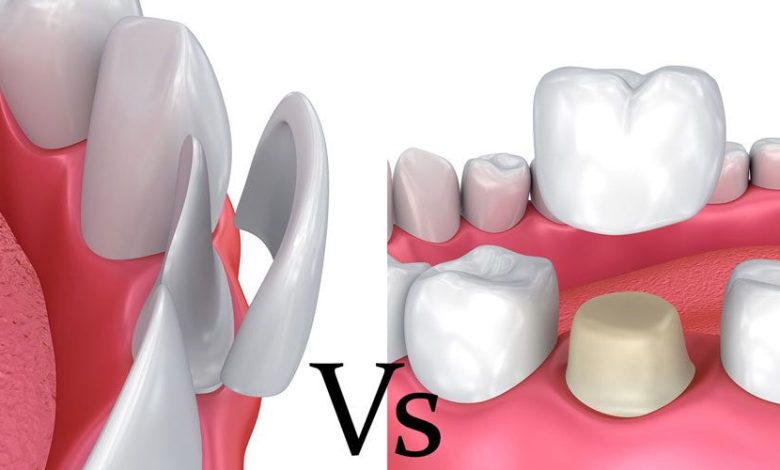Porcelain Veneers vs Dental Crowns: Procedure, Benefits, and Cost

When it comes to improving the appearance of your teeth, porcelain veneers and dental crowns are two common options. Here’s a closer look at what these procedures entail and the benefits they offer.
Porcelain Veneers
Porcelain veneers are ultra-thin shells of porcelain that are custom-made to fit over the front surface of your teeth. They are used to improve the appearance of teeth that are stained, chipped, misaligned, or have gaps.
Porcelain Veneers Procedure
The process of getting porcelain veneers typically involves two or three appointments. During the first appointment, your dentist will prepare your teeth by removing a small amount of enamel from the front surface. Impressions will then be taken of your teeth to create custom veneers. In the meantime, temporary veneers will be placed on your teeth.
During the second appointment, the custom veneers will be carefully placed onto your teeth, using a special dental adhesive. Your dentist will then make any necessary adjustments to ensure a proper fit.
Benefits
Porcelain veneers offer several benefits, including:
- Improved appearance: Porcelain veneers can dramatically improve the appearance of your teeth, giving you a brighter, straighter, and more youthful-looking smile.
- Durability: Porcelain veneers are strong and durable, and with proper care, they can last for many years.
- Customization: Porcelain veneers are custom-made to fit your teeth and match the color of your existing teeth.
- Minimal tooth reduction: Unlike dental crowns, porcelain veneers require minimal tooth reduction.
Porcelain Veneers Cost:
The cost of porcelain veneers varies, depending on several factors such as the number of veneers needed, the location of the dental office, and the experience of the dentist. On average, the cost of porcelain veneers ranges from $1,000 to $2,500 per tooth.
Dental Crowns
A dental crown is a cap that covers a damaged tooth, restoring its shape, size, strength, and appearance. Dental crowns can be made from a variety of materials including ceramic, porcelain, metal, and resin.
Procedure:
The process of getting a dental crown typically involves two appointments. During the first appointment, your dentist will prepare the tooth by removing any decay and shaping the tooth to make room for the crown. Impressions will then be taken of the tooth to create a custom crown. In the meantime, a temporary crown will be placed on the tooth. During the second appointment, the custom crown will be carefully placed onto the tooth, using a special dental adhesive. Your dentist will then make any necessary adjustments to ensure a proper fit.
Benefits:
Dental crowns offer several benefits, including:
- Improved appearance: Dental crowns can dramatically improve the appearance of your teeth, giving you a brighter, straighter, and more youthful-looking smile.
- Protection: Dental crowns Brisbane protect damaged or weak teeth from further injury and prevent breakage.
- Improved function: Dental crowns restore the ability to bite and chew properly, improving overall oral function.
- Longevity: With proper care, dental crowns can last for many years.
Cost:
The cost of dental crowns can vary depending on several factors such as the type of material used (porcelain, ceramic, metal, resin), the location of the dental office, and the experience of the dentist. On average, the cost of dental crowns can range from $1,000 to $3,000 per tooth. It’s always a good idea to get quotes from several dentists and compare their prices, expertise, and track record before making a decision.
In conclusion
Porcelain veneers and dental crowns are two effective solutions for improving the appearance and function of your teeth. Both procedures offer a range of benefits, including a brighter, straighter, and more youthful-looking smile, protection against further injury, and improved oral function.
When choosing between porcelain veneers and dental crowns, it’s important to consider your individual needs and goals. Porcelain veneers are best for improving the appearance of teeth that are stained, chipped, misaligned, or have gaps, while dental crowns are best for protecting and restoring damaged or weak teeth.



